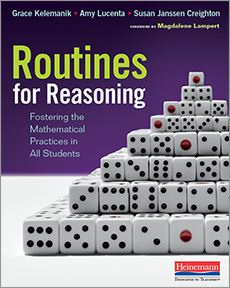Routines for Reasoning Book Study:
PROMPTS AND RESPONSES
This book study is complete. Thanks to all who participated!
Instructions: [Please register before commenting on the prompts below.] Please read the prompts for each chapter and add your thoughts and comments below. Please keep your entries professional and respectful. Use the reply option if you have a question or comment on someone else's post. We can make this an interactive space - an ongoing conversation - and get the most out of our learning together. Starting January 4, each Friday, we will post two prompts for that week’s chapter. You may choose to respond to either or both prompts. It's okay to go back to previous weeks if you fall behind. The posting schedule and running history of prompts is here. |
Book Study Prompts and Responses:
